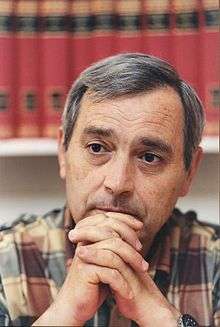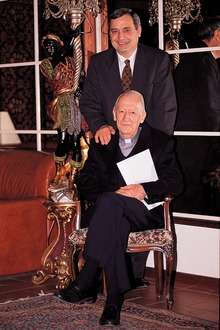Vittorio Messori
Vittorio Messori (born 1941) is an Italian journalist and Writer. According to Sandro Magister, a Vaticanist, he is the "most translated Catholic writer in the world."[1]

Life

Messori was born in Sassuolo near Modena in Italy. He attended the prestigious Lycée D'Azeglio in Turin. Later, he graduated in political sciences, with a thesis on the Risorgimento.
Messori had a completely secular upbringing. He was warned against priests by his mother, who often said that the Church was "only a pub." The schools he attended imparted an equally secular culture, and when he enrolled in the faculty of political science at Turin, all the teachers there taught "a radical, impenetrable agnosticism." He was "happy" with this, and "was preparing for a career as an entirely secular intellectual."[2]
In July and August 1964, however, he unexpectedly entered a new kind of dimension. In his own words, "the truth of the Gospel, that until then was unknown to me, became very clear and tangible. Even though I had never attended Church, even though I had never studied religion, I found that my perspective as a secularist and agnostic had become suddenly Christian. What's more, Catholic."[2]
Messori's teachers were "very surprised and disappointed" when he confessed that he had become a Catholic. They regarded his conversion as "a psychiatric crisis, a depression, a mistake," with the result that, as Messori says, "they abandoned me and finally disowned me."[2]

After graduating, Messori attended courses at the Institute of Christology at Assisi. It was there that he met his future wife, Rosanna Brichetti. In 1968 he returned to Turin, where he joined the editorial staff of a large publishing house. Later he directed its press office. For several years, he was a reporter for Stampa Sera, before the editor of La Stampa appointed him one of the group of three journalists who created the weekly Tuttolibri.
He is a profound explorer of the questions raised by Christianity and especially Catholicism. His most influential books include Jesus Hypotheses (1977), The Ratzinger Report (1987), and Opus Dei (1996). He also conducted the first book-length interview with Pope John Paul II, published under the pope's authorship with the title Crossing the Threshold of Hope (1994).
Books translated into English
- Jesus Hypotheses (1978)
- The Ratzinger Report: An Exclusive Interview on the State of the Church (editor) (1985)
- Faith's Answer: The Mystery of Jesus (1986)
- Crossing the Threshold of Hope, by His Holiness John Paul II (editor) (1994)
- Opus Dei: Leadership and Vision in Today's Church (1997)
- Kidnapped by the Vatican? The Unpublished Memoirs of Edgardo Mortara (2017)
See also
References
- Sandro Magister. "From Rome to the World: The Global Offensive of the Catholic Media" Archived 22 April 2005 at the Wayback Machine, 20 August 2004
- Catholic writer explains conversion, discusses new book, Catholic News Agency, 16 November 2009
External links
- Home page of Vittorio Messori – in Italian.
- Vittorio Messori review of Mel Gibson's "The Passion of the Christ"
- Interview with Messori about anti-catholic provocations (pdf), in Il Giornale, 23 June 2007